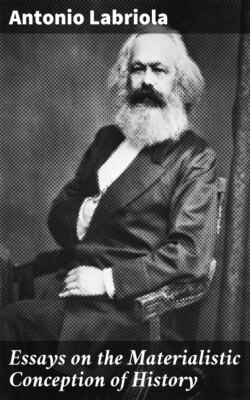Essays on the Materialistic Conception of History

Реклама. ООО «ЛитРес», ИНН: 7719571260.
Оглавление
Antonio Labriola. Essays on the Materialistic Conception of History
Essays on the Materialistic Conception of History
Table of Contents
PART I
IN MEMORY OF THE COMMUNIST. MANIFESTO
ESSAYS
on the
Materialistic Conception of History
PART I
IN MEMORY OF THE COMMUNIST MANIFESTO. I
Footnote
PART II
HISTORICAL MATERIALISM
PART II
HISTORICAL MATERIALISM. I
II
III
IV
V
VI
VII
VIII
IX
X
XI
XII
THE END
Footnote
Отрывок из книги
Antonio Labriola
Published by Good Press, 2021
.....
The Manifesto did not make, and it was not its part to make the picture of a future society. It told how our present society will dissolve by the progressive dynamics of its forces. To make this understood it was necessary above all to explain the development of the bourgeoisie and this was done in rapid sketches, a model philosophy of history, which can be retouched, completed and developed, but which cannot be corrected.[6]
Saint-Simon and Fourier, although neither their ideas nor the general trend of their development were accepted, found their justification. Idealists both, they had by their heroic vision transcended the “liberal” epoch which in their horizon had its culminating point at the epoch of the French revolution. The former in his interpretation of history substituted social physics for economic law and politics, and in spite of many idealistic and positivistic uncertainties, he almost discovered the genesis of the third estate. The other, ignorant of details which were still unknown or neglected, in the exuberance of his undisciplined spirit imagined a great chain of historic epochs vaguely distinguished by certain indications of the directing principle of the forms of production and distribution. He thereupon proposed to himself to construct a society in which the existing antitheses should disappear. From all these antitheses he discovered by a flash of genius and he, more than any other, developed “the vicious circle of production”; he there unconsciously reached the position of Sismondi, who at the same epoch, but with other intentions and along different roads, studying crises and denouncing the disadvantages of the large scale industry and of unbridled competition, announced the collapse of the newly established economic science. From the summit of his serene meditation on the future world of the harmonians he looked down with a serene contempt upon the misery of civilization and unmoved wrote the satire of history. Ignorant both, because idealists, of the bitter struggle which the proletariat is called upon to maintain before putting an end to the epoch of exploitation and of antitheses, they arrived through a subjective necessity at their conclusions, in the one case scheme-making, in the other utopianism. But as by divination they foresaw some of the direct principles of a society without antitheses. The former reached a clear conception of the technical government of society in which should disappear the domination of man over man, and the other divined, foresaw and prophesied along with the extravagances of his luxuriant imagination a great number of the important traits of the psychology and pedagogy of that future society in which according to the expression of the Manifesto, “the free development of each is the condition of the free development of all.”
.....